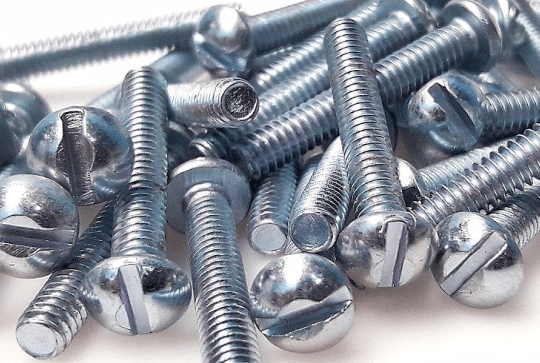
Stainless steel is one of the most employed materials for the production of screws, bolts, and other fasteners. Fasteners manufactured in stainless steel are applied in almost all industrial sectors.
The unique cases in which their use is to avoid is when materials have to provide electrical insulation.
It’s very important to know the characteristics of this material in order to choose the adequate products to work with.
Technically speaking, stainless steel is an alloy of iron (50% or more) with a minimum of 12% of chrome. Chrome, when is inserted in enough content of an alloy, produces a thin layer of oxide on the surface of the steel known as the ‘passive layer’. This prevents any further corrosion of the surface. Increasing the amount of Chromium gives an increased resistance to corrosion.
Stainless steel also contains varying amounts of Carbon, Silicon and Manganese.
The variation of all these elements defines the structural and mechanical features of stainless steel and his resistance to corrosion.
According to their crystalline structure, which is determined by the chemical composition, stainless steels are traditionally subdivided into four large families:
. Ferritic stainless steels
. Martensitic stainless steels
. Austenitic stainless steels
. Duplex
Austenitic stainless steel
Austenitic stainless steels are the most widely used type for the manufacturing of fasteners.
They are characterized by a face-centred cubic structure, containing carbon, nickel and chromium with the possible addition of other elements, such as molybdenum, titanium and niobium. Austenitic stainless steels aren’t ferromagnetic and therefore they are recognizable because are not attracted by a magnet.
This kind of inox steels provides an excellent corrosion resistance along with the good polishability and excellent hygienic coefficient.
Austenitic stainless steel, like other inox steels, is available in different grades that can be used to manufacture screws, nuts, bolts and fasteners.
A2 (AISI 304) and A4 (AISI 316) are the most employed grades. Higher tensile grades of A2-70 and A4-80 stainless steel have become the norm.
There’s no visible difference between A2 and A4 inox steels. However, they have characteristics slightly different.
Grade A2 stainless steel is mainly employed in the chemical and food industry whereas A4, also known as marine grade stainless steel, is largely used in marine and naval applications due to his excellent resistance to salt spray.
A2 inox steel is composed of chromium 18% and nickel 8% whilst A4 inox steel is composed of the same quantity of chromium and nickel plus 3% molybdenum.
The molybdenum is added to help resist corrosion to chlorides (like seawater and other acidic substances).
Moreover, A4 stainless steel makes the fasteners easier to fabricate, clean, finish and weld.
Fasteners of grade A2, have excellent resistance to atmospheric corrosion except in severe marine and industrial environments.
Oxidation resistance is satisfactory for use up to 850°C. Resistance to nitric acid and other oxidising chemicals is excellent.
Albeit it is not hardenable by heat treatment, A2 inox steel is greatly strengthened by cold working.
Stainless fasteners of grade A4 have a higher corrosion resistance than A2 grade in many chemical environments, including contact with dilute sulphuric acid, and acetic acid over a wide range of temperature and concentration. Oxidation resistance is satisfactory for use up to 800°C.
Although A4 inox steel is more expensive than A2, its use is convenient in particularly aggressive environments in the long run due to the higher resistance to corrosion.
With fifty years of experience in the sector and over 70,000 references in stock VIPA is a leading supplier of screws, bolts and fastening systems.
It offers a large supply of screws, bolts and fasteners manufactured in stainless steel A2/A4 70.
Its qualified staff is always available to support clients throughout the purchase process, supporting them in the choice of the most suitable products, according to the various needs.
